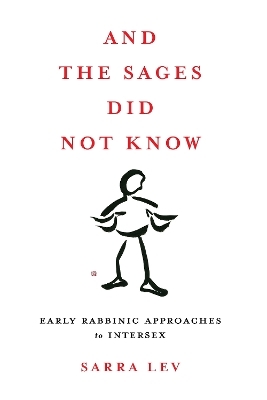
And the Sages Did Not Know
Early Rabbinic Approaches to Intersex
Seiten
2024
University of Pennsylvania Press (Verlag)
978-1-5128-2517-6 (ISBN)
University of Pennsylvania Press (Verlag)
978-1-5128-2517-6 (ISBN)
This book explores the question: How did the rabbis of the first two centuries CE approach bodies that are born with variant genitals—bodies that they could not identify as definitely male or female? The rabbis had constructed a system in which every behavior was governed by one’s sex/gender, posing a conundrum both for people who did not fit into that model and for the rabbinic enterprise itself. Despite this, their texts contain dozens of references to intersex.
And the Sages Did Not Know examines the rabbis’ legal texts and concludes that they had multiple approaches to intersex people. Sarra Lev analyzes seven different rabbinic responses to this conflict of their own making. Through their rulings on how intersex people should conduct themselves in multiple circumstances, the early rabbis treat intersex people as unidentifiable males or females, as indeterminate, as male, as non-gendered, as sui generis, as part-male/part-female, as a sustainable paradox, and, finally, as a way for them to think about gender, having nothing to do with intersex people themselves.
This is the first such work that concentrates primarily on the potential effects of these rabbinic texts on intersex persons themselves rather than focusing on what the texts offer readers whose interest is rabbinic approaches to sex and gender or gender diversity. Although the rabbinic texts do not include the voices of known intersex people, these materials do offer us a window into how one small group of people approached intersex bodies, and how those approaches were both similar to and different from those we recognize today.
And the Sages Did Not Know examines the rabbis’ legal texts and concludes that they had multiple approaches to intersex people. Sarra Lev analyzes seven different rabbinic responses to this conflict of their own making. Through their rulings on how intersex people should conduct themselves in multiple circumstances, the early rabbis treat intersex people as unidentifiable males or females, as indeterminate, as male, as non-gendered, as sui generis, as part-male/part-female, as a sustainable paradox, and, finally, as a way for them to think about gender, having nothing to do with intersex people themselves.
This is the first such work that concentrates primarily on the potential effects of these rabbinic texts on intersex persons themselves rather than focusing on what the texts offer readers whose interest is rabbinic approaches to sex and gender or gender diversity. Although the rabbinic texts do not include the voices of known intersex people, these materials do offer us a window into how one small group of people approached intersex bodies, and how those approaches were both similar to and different from those we recognize today.
Sarra Lev is Professor of Rabbinics and Chair of the Department of Rabbinic Civilization at Reconstructionist Rabbinical College and Jewish Reconstructionist Communities.
Preface
Notes on Usage
Introduction
A Brief Excursus on “Rabbinic Intersex”
Chapter 1. Frames of Reference
Chapter 2. Deconstructing the Binary, or Not?
Chapter 3. The Sui Generis Model
Chapter 4. The Uncertainty Model: Creating Contingency Plans
Chapter 5. The “Non-” Model and Genre: What a Difference Wordplay Makes
Chapter 6. The Maleness Model: Making a Male
Chapter 7. The Part/Part Model: Dissecting the Body
Chapter 8. Encountering an Androginos: The Truth of Paradox
Epilogue
Glossary
Notes
Bibliography
Index
Acknowledgments
| Erscheinungsdatum | 11.07.2023 |
|---|---|
| Verlagsort | Pennsylvania |
| Sprache | englisch |
| Maße | 152 x 229 mm |
| Themenwelt | Geschichte ► Teilgebiete der Geschichte ► Religionsgeschichte |
| Geisteswissenschaften ► Religion / Theologie ► Judentum | |
| Sozialwissenschaften ► Soziologie ► Gender Studies | |
| ISBN-10 | 1-5128-2517-4 / 1512825174 |
| ISBN-13 | 978-1-5128-2517-6 / 9781512825176 |
| Zustand | Neuware |
| Informationen gemäß Produktsicherheitsverordnung (GPSR) | |
| Haben Sie eine Frage zum Produkt? |
Mehr entdecken
aus dem Bereich
aus dem Bereich
Herkunft, Blüte, Weg nach Osten
Buch | Hardcover (2024)
C.H.Beck (Verlag)
39,00 €
Von den Anfängen bis zur Gegenwart
Buch | Hardcover (2022)
C.H.Beck (Verlag)
34,00 €
warum die Religionen erst im Mittelalter entstanden sind
Buch | Hardcover (2024)
C.H.Beck (Verlag)
38,00 €


